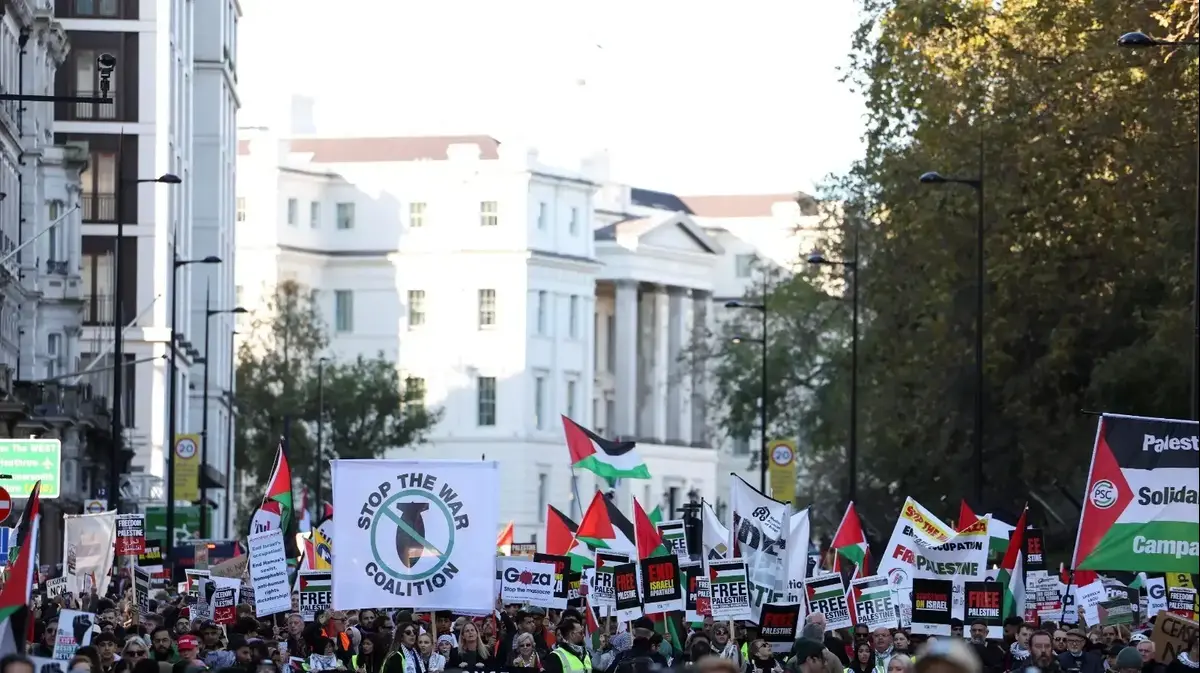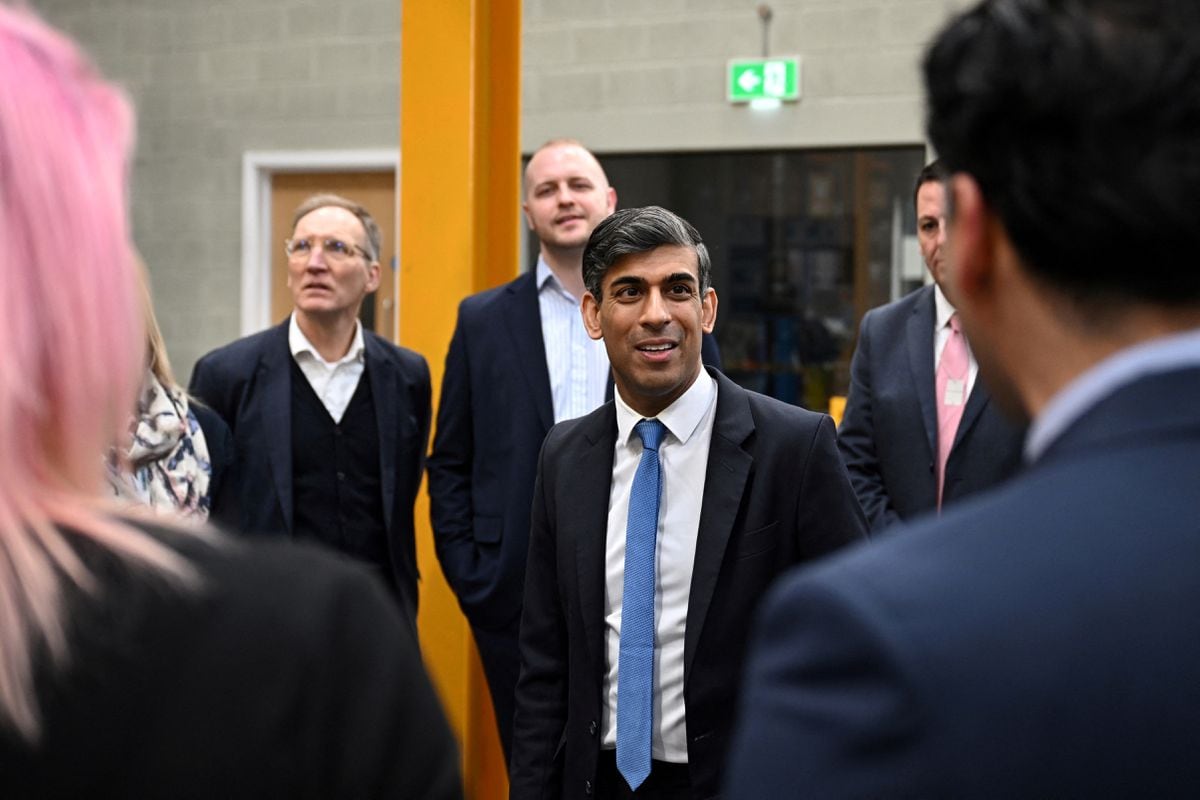Rishi Sunak has achieved political triumph when it was too late.
He arrived at Downing Street at the end of October and became Prime Minister of the United Kingdom, with the sole purpose of trying to revive a Conservative Party in a terminal state, and an economy in recession that had not been able to materialize even one of the supposed promises that many eurosceptics -Sunak among them- anticipated with the conquest of Brexit.
The year ends with a wave of strikes that the government has been unable to appease, and that has even fueled an ideological confrontation.
Railways, public transport, postal service, nurses, ambulances... even border control and customs personnel carried out a strike this Friday that complicated Christmas trips.
It is common currency in the media to talk about a new “winter of discontent”, in memory of the wild labor unrest of the late 1970s, which led to the arrival of Margaret Thatcher.
Or to ask again in a rhetorical way if the United Kingdom is once again "the sick man of Europe".
The bill for this new depression, however, has its own recipe, and it is already beginning to be seen how much of the blame lies with the traumatic departure from the European Union.
Two years have passed since the last chapter of that divorce at the end of December.
its own recipe, and it is already beginning to be seen how much of the blame lies with the traumatic departure from the European Union.
Two years have passed since the last chapter of that divorce at the end of December.
its own recipe, and it is already beginning to be seen how much of the blame lies with the traumatic departure from the European Union.
Two years have passed since the last chapter of that divorce at the end of December.
“The simplest way to think about what Brexit has done to the economy is to break it down into periods.
In the post-referendum [2016], there was the largest overnight depreciation that any of the world's four largest economies had ever experienced.
Prices rose, and wages fell—not only in nominal terms, but also in real terms.
The calculation made suggests that salaries are 2.6% below where they should be," Swati Dhingra, Associate Professor of Economics at the
London School of Economics , recently explained to a parliamentary committee.
(LSE) and external member of the Bank of England Monetary Policy Committee.
Dhingra is one of the analysts who has made the most effort to decipher the real damage caused by that separation, which the different conservative governments have tried to camouflage all this time between the ravages of the pandemic and, recently, among the consequences of the war in Ukraine. .
The country suffers from the same energy crisis as the rest of Europe, with crazy bills that the Government has tried to alleviate with multi-million dollar subsidies.
The exit from confinement, with the tensions in the supply chain, brought with it galloping inflation – today at 9.7%.
But the debacle of the labor market has much of its own making.
“The most lasting legacy of Brexit will be slower growth in real wages and productivity over the next decade.
Workers in most sectors and all regions must prepare for severe cuts to their payrolls as the economy continues to adjust to Brexit.
And this comes after a decade of stagnant wages, coupled with a sharp increase in the cost of living due to high inflation."
The Big Brexit: An Assessment of the Scale of Change to Come from Brexit
.
The blow to the public sector
Like a house of cards, the problems accumulated in recent months —in recent years— have fallen headlong on the Sunak government.
Workers in a highly neglected public sector have seen their real purchasing power fall by 20% in the last decade.
The Government is unable to reduce a workload that, in the case of the National Health Service (NHS), was overwhelmed during the pandemic.
The British labor market has lost more than a million workers since the outbreak of covid-19.
Many of them, victims of the long-term consequences of the disease or other ailments neglected during confinement;
many others, because they returned to their countries of origin from the EU, and Brexit discouraged them from returning;
Finally,
many early retirements in a fundamentally private pension system.
All this has increased the pressure on hospitals, health centers, public transport and other services, which must serve a population with growing demand.
At the same time that the places to be filled in those same services continue to be covered.
“Across many departments in our public sector, we don't have the volume of staff we need, and if those who remain are still paid below the private sector, the problem will only get worse,” David Gauke wrote. , former Minister of Justice, and of Work and Pensions, and today distanced from the Conservative Party for his unwavering rejection of Brexit.
Sunak is incapable of pulling out the necessary political muscle to solve a challenge like that of the unions, which the Conservatives have not counted on since Thatcher tied them up short and David Cameron finished them off with laws that limited the right to strike.
Clinging to ideology, and convinced that the tiredness of the citizenry will bend the arm to the strikers, he has closed in on himself and does not want to hear about wage increases that further aggravate inflation.
No border control
The great promise of Brexit —
take back control
(regain control), especially of the borders — has been one of the biggest traps into which the Conservative government has fallen.
British employers have desperately asked Sunak to relax immigration rules to let in labor.
“We have people lining up to enter this country and collect the crops that are rotting in the fields, or work in the warehouses that are not operational today.
And we don't let them in.
This is not the Brexit I wanted," Simon Wolfson, the chief executive of fashion chain
Next
, and one of the Conservative Party's biggest donors, told the BBC in November.
Paradoxically, both the Prime Minister, Sunak, and the leader of the Labor opposition, Keir Starmer, have their hands tied, albeit for different reasons.
The former lives in a delicately balanced position, and cannot unleash the wrath of the hard wing of the party with the decision to open the doors to immigration.
No, while he continues without solving the biggest challenge of his mandate - after the economy -: the more than 40,000 people who have reached British soil through the English Channel this year alone and who have placed irregular immigration at a level that provokes the worst feelings among Conservative MPs and voters.
Starmer, meanwhile, tries to avoid confrontation with the voters that his party aspires to recover, and who in 2019 voted for Boris Johnson's Brexit irritated, to a large extent,
The Sunak government and the Conservative Party are on their way to being the last to find out —or to accept— what businessmen, economists and think tanks already openly recognize and discuss: the first storms of the current “winter of discontent” that is plaguing the country they began to form eight years ago, with the Brexit referendum.
Follow all the international information on
and
, or in
our weekly newsletter
.
Subscribe to continue reading
Read without limits
Keep reading
I'm already a subscriber







/cloudfront-eu-central-1.images.arcpublishing.com/prisa/W7LXNNLUAS4RTRH4YTRS7U3MAU.jpg)






